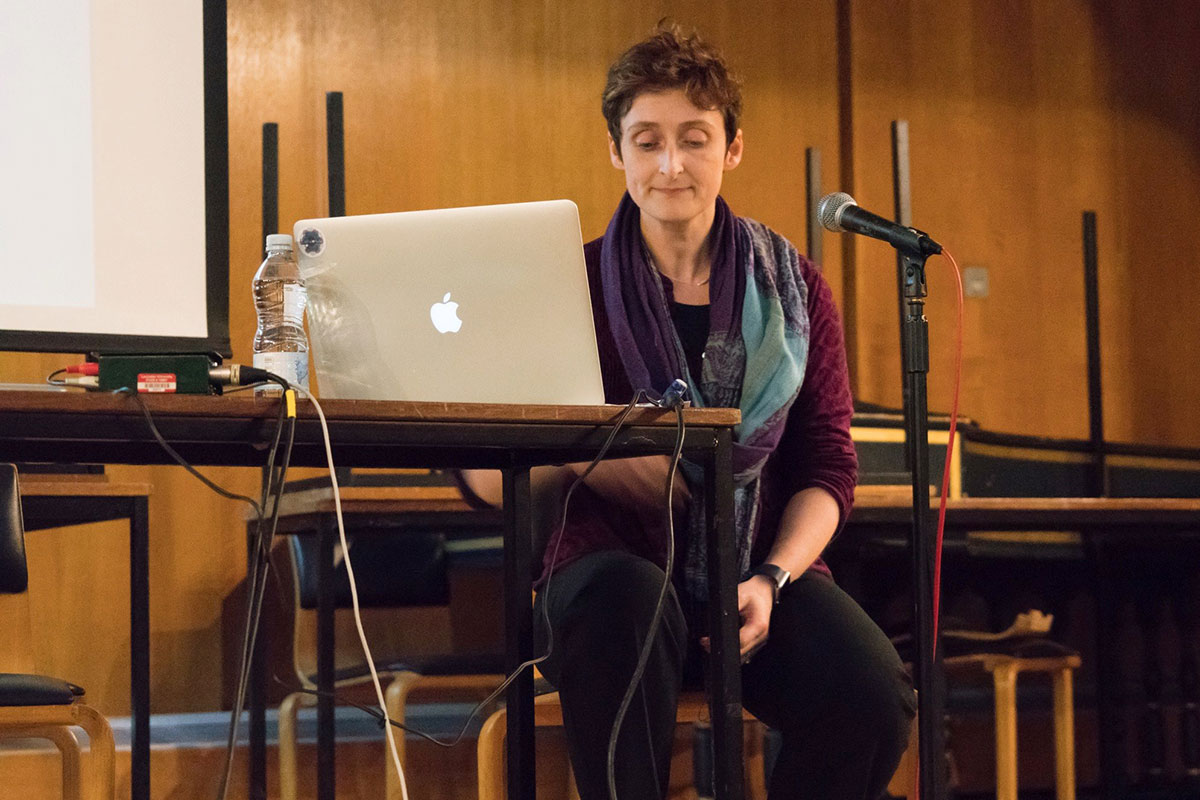Liz Dobson: Interaction, Agency and The Role of Talk in Music Technology Education (14.10.19)
Monday 14 October 2019 // 15:00-16:00 // The Portal, Fjordgata 1 (2nd floor), 7010 Trondheim // The Portal, Department of Musicology (ZEB building), Sem Sælands vei 2, 0371 Oslo

Abstract
Human development is mediated through a moment-by-moment relationship with our situation; shaped by cultural contexts, social interactions, and the use of physical tools, which are themselves developed out of the concepts that shape thinking and learning about music. Music Technology education however, is often viewed in terms of how technology is designed and the kinds of learning and creativity that it affords. Empirically, the emphasis is more often around human computer interaction. Drawing on Lev Vygotsky’s work on how our interface with the world shapes higher mental development, I will present a case for understanding the influence of human interaction and community on music technology education.
Following my PhD investigating the social psychology of collaborative creativity in 2012, I developed of a set of practice principles for music technology education. This particular approach to supporting learning and creativity was explored through an extra-curricular multi-disciplinary collaboration sandpit, where students launched new projects, forming a professional practice network alongside their formal education. Encouraged by the impact of this on their personal development, I felt that something similar could be available for women in audio as statistics show our audio industries to be so overwhelmingly male; I called the first meeting of the Yorkshire Sound Women Network in 2015.
In this talk I will discuss relationships between learning, social capital, collaborative enterprise and professional development in this context, and how this has opened new avenues of personal creative practice, as well as new multimodal research on interaction amongst girls participating in music technology education.
Bio
Dr Elizabeth Dobson is a National Teaching Fellow of the HEA, and Principle Enterprise Fellow in music technology at The University of Huddersfield, where she teaches modules in sonic arts and electronica, sound for media, computer based composition, and empirical research for musicians. After completing her PhD on social psychology and creativity in music technology education, she founded/co-founded two knowledge-sharing projects: CollabHub, and Yorkshire Sound Women Network C.I.C., and maintains an ongoing commitment to new interdisciplinary research on inclusive music technology education. Her more recent work include curating a Sound and Music Electronic Music Production Summer School for girls, an artist residency at Q-02 in Brussels, and a book chapter, ‘Digital Audio Ecofeminism: The Glocal Impact of All-female Communities on Learning and Sound Creativities’ in L. De Bruin, P. Burnard and S. Davis (Eds.) Creativities in Arts Education, Research and Practice: Glocalised Perspectives for the Future of Learning and Teaching.
Live Stream Recording of the Event
Photo thumbnail by Robin Støckert.
A talk hosted at the Department of Music, Norwegian University of Science and Technology (NTNU) in Trondheim and live streamed through the MCT Portal to the University of Oslo (UiO) and also through YouTube. The audience combines two physical sites (from Oslo and Trondheim) plus online viewers from all over the world.
Video Credits
Speaker: Liz Dobson
Presenter (Trondheim): Anna Xambó
Presenter (Oslo): Ane Bjerkan
Audio Mixer (Trondheim): Jørgen Varpe
Audio Production (Trondheim): Jørgen Varpe, Sepehr Haghighi
Audio Mixer (Oslo): Jarle Folkeson Steinhovden
Streaming (Trondheim): Eigil Aandahl
Camera (Trondheim): Shreejay Shrestha
Technical Supervision: Robin Støckert, Anders Tveit
Production (Trondheim): Karolina Jawad
Production (Oslo): Ane Bjerkan
Audio processing: Sepehr Haghighi
Intro Video: Karolina Jawad
Seminar Series Curation: Anna Xambó
Acknowledgments: Robin Støckert, Anders Tveit, Alexander Refsum Jensenius, Ellen Karlsen Holmås, Maj Vester Larsen
Supported by: Norwegian University of Science and Technology (NTNU), University of Oslo (UiO)
In collaboration with: Master in Music, Communication and Technology (MCT)
